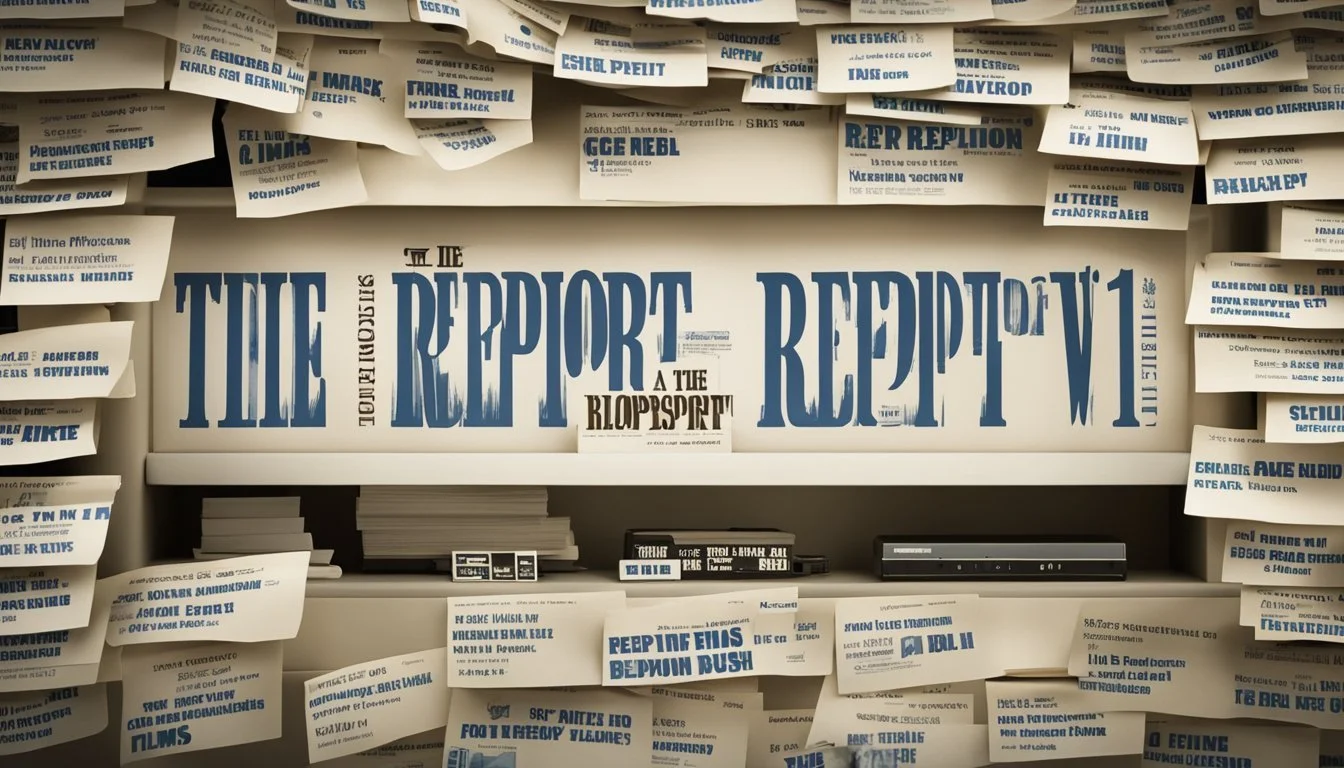11 Films Exploring the Presidency of George W. Bush
A Cinematic Perspective
The presidency of George W. Bush is a period rife with significant events and decisions that have had a lasting impact on global and American politics. Exploring this era through the lens of cinema provides a unique perspective on the complexities and controversies of Bush's time in office.
From documentaries that dive into the political and social dynamics of the early 2000s to biographical films that offer an intimate look at Bush's personal and political life, these movies capture a multifaceted portrayal of his presidency. Such films serve as valuable tools for both historical reflection and contemporary analysis.
1) W. (2008)
"W." is a biographical drama directed by Oliver Stone. The film explores the life and presidency of George W. Bush, capturing significant moments from his early years up to his time in the White House.
The film portrays Bush's personal and political struggles, including his journey to overcome substance abuse and his fraught relationship with his father.
Stone's depiction focuses on Bush's decision-making process during crucial events, providing insight into his administration's handling of the Iraq War.
The film stars Josh Brolin as George W. Bush, delivering a performance that received critical acclaim for its depth and accuracy.
For more information, visit Wikipedia.
2) Vice (2018)
"Vice" explores the political career of Dick Cheney, who served as Vice President under George W. Bush. Directed by Adam McKay, the film stars Christian Bale as Cheney, with an emphasis on his role in shaping significant policies of the Bush administration.
The movie provides a detailed portrayal of Cheney's rise to power, starting from his early days as Gerald Ford's White House Chief of Staff to his tenure as Vice President.
The narrative demonstrates Cheney's influence behind major decisions, illustrating his impact on domestic and foreign policies. Notable events covered include the Iraq War and intensified counter-terrorism measures.
Christian Bale's transformation into Cheney is a central feature, showcasing both his physical transformation and his ability to capture Cheney's demeanor. Supporting performances by Amy Adams, Steve Carell, and Sam Rockwell add depth to the portrayal of key political figures.
"Vice" uses a mix of dark humor and dramatic storytelling to critique and entertain, presenting a unique perspective on the Bush-Cheney administration. The film is notable for its unconventional narrative style and its critical take on Cheney's legacy.
For further details, visit IMDB.
3) Fair Game (2010)
"Fair Game" is a political thriller film directed by Doug Liman.
The movie centers around the true story of Valerie Plame, a covert CIA operative whose identity was leaked to the public.
Her exposure came after her husband, former diplomat Joseph Wilson, publicly challenged the Bush administration’s justification for the Iraq War.
Plame, portrayed by Naomi Watts, and Wilson, played by Sean Penn, navigate intense political fallout and personal turmoil as they seek justice.
"Fair Game" highlights the harsh realities of political warfare within the highest levels of the U.S. government.
The film delves into themes of government accountability, media influence, and personal sacrifice.
The narrative is grounded in real events, providing an engaging depiction of the tension between government secrecy and public accountability.
Doug Liman’s direction emphasizes authenticity, with strong performances bringing the real-life drama to the big screen effectively.
"Fair Game" offers a profound look at a controversial chapter in American politics.
Its relevance remains significant, illustrating the impact of political decisions on individual lives and the broader implications for democracy.
4) Zero Dark Thirty (2012)
"Zero Dark Thirty" is a gripping portrayal of the decade-long hunt for Osama bin Laden.
Directed by Kathryn Bigelow, the film illustrates the intense investigation following the 9/11 attacks.
It highlights the strategies and operations led by the CIA, including the controversial interrogation techniques used.
The film sheds light on the political and military decisions made during George W. Bush’s presidency.
It offers insights into the post-9/11 policies implemented to address national security concerns.
While the focus is on the manhunt, the background of Bush's administration policies remains a key element.
For more details, visit the IMDB page of Zero Dark Thirty (2012).
5) Green Zone (2010)
"Green Zone," directed by Paul Greengrass, is a thriller set during the early days of the Iraq War. The film centers on Chief Warrant Officer Roy Miller, played by Matt Damon, who is tasked with finding weapons of mass destruction in Iraq.
Miller quickly discovers inconsistencies in the intelligence provided and begins to question the official narrative.
The film addresses themes of misinformation and political manipulation, highlighting the chaos and uncertainty of the war. It provides a critical perspective on the claims made by the Bush administration regarding Iraq's alleged weapons of mass destruction.
As Miller delves deeper, he uncovers a web of deceit that raises questions about the true motivations behind the invasion.
"Green Zone" offers a tense and engaging viewpoint on the Iraq War, supported by strong performances and a gripping storyline. For more information on the film, visit IMDB.
6) The Report
"The Report" (2019) delves into the investigation of the CIA's Detention and Interrogation Program post-9/11. The film follows Daniel J. Jones, a lead investigator who uncovers the controversial use of torture tactics.
Adam Driver stars as Jones, delivering a compelling portrayal of the relentless quest for truth.
The film is based on real events and highlights the complexities and moral questions surrounding the Bush administration's response to terrorism.
By exposing the brutal methods and bureaucratic challenges, "The Report" offers a critical view of governmental accountability.
More information: Wikipedia
7) In the Valley of Elah (2007)
In the Valley of Elah explores the ramifications of war and its impact on families. Written and directed by Paul Haggis, the film stars Tommy Lee Jones, Charlize Theron, and Susan Sarandon. It is based on true events, with names and locations altered.
The film follows a retired military investigator who collaborates with a police detective to discover the truth behind his son's disappearance after returning from Iraq.
Set against the backdrop of the Iraq War, this film brings attention to the psychological trauma faced by soldiers and their families. The title references the Biblical valley where David fought Goliath, symbolizing the struggle against overwhelming odds.
For further details on the film, visit IMDb.
8) American Sniper (2014)
"American Sniper" is a biographical war drama film released in 2014. Directed by Clint Eastwood, it stars Bradley Cooper as Chris Kyle, a Navy SEAL sniper.
The film delves into Kyle's four tours in Iraq and his struggle to balance his military and family life. It explores the impact of his service on his mental health and his relationship with his wife, played by Sienna Miller.
Though it primarily focuses on Kyle, the film offers insights into the broader context of the Iraq War, an integral part of George W. Bush’s presidency. It provides a stark portrayal of the challenges faced by American soldiers during the conflict.
"American Sniper" was both a critical and commercial success. It received several Academy Award nominations and won the Oscar for Best Sound Editing.
For more information, refer to American Sniper on Wikipedia.
9) Lions for Lambs (2007)
"Lions for Lambs" is a war drama film directed by Robert Redford. It stars Tom Cruise, Meryl Streep, and Redford himself. The movie explores the consequences of U.S. military involvement in Afghanistan during George W. Bush's presidency.
The film interweaves three separate storylines. One involves a U.S. senator, played by Cruise, trying to sell a new military strategy to a skeptical journalist, portrayed by Streep.
Another storyline focuses on Redford playing a college professor attempting to inspire a disengaged student. The third follows two American soldiers caught in a harrowing situation in Afghanistan.
The film raises questions about patriotism, the media’s role, and the responsibilities of both politicians and citizens during times of war.
Released in 2007, it reflects the intense debate over the Bush administration's handling of the war on terror. "Lions for Lambs" serves as a sharp critique of the political and ethical decisions made during his tenure.
For more information, visit Lions for Lambs on Wikipedia.
10) The Hurt Locker (2008)
"The Hurt Locker" is a 2008 American war thriller film directed by Kathryn Bigelow. It focuses on an Explosive Ordnance Disposal (EOD) team during the Iraq War. Unlike many traditional war films, "The Hurt Locker" emphasizes the psychological impact of war on its characters.
The film stars Jeremy Renner, Anthony Mackie, and Brian Geraghty. Renner's portrayal of Staff Sergeant William James provides a gripping look into the mind of a bomb disposal expert. The intense stress and life-or-death stakes of their missions highlight the personal struggles faced by soldiers.
Mark Boal, the screenwriter, brings a level of authenticity to the story, having spent time embedded with a bomb squad in Iraq. This experience lends a realistic touch to the portrayal of the team’s dismantling of improvised explosive devices (IEDs).
Though the film primarily centers on its characters’ experiences in Iraq, it also indirectly reflects on the broader policies and decisions made during George W. Bush's presidency. The focus on the Ground-level reality of war provides a unique lens through which to view the ongoing conflict initiated during Bush's time in office.
More Information: The Hurt Locker on Wikipedia
11) Body of Lies (2008)
"Body of Lies" is a 2008 spy thriller directed by Ridley Scott. While not strictly about the presidency of George W. Bush, it contextualizes the geopolitical climate of the era.
The film stars Leonardo DiCaprio as a CIA operative and Russell Crowe as his handler. Their characters navigate the complex terrain of Middle Eastern terrorism and U.S. intelligence operations.
The narrative examines the ethical and operational challenges faced by U.S. agencies. It reflects the broader strategies and dilemmas within the Bush Administration's war on terror.
Through its storyline, "Body of Lies" indirectly critiques elements of U.S. foreign policy. Issues such as surveillance, interrogation methods, and international alliances are central themes.
"Body of Lies" provides viewers with a dramatized view that invites reflection. It underscores the tension between security measures and moral considerations during Bush's presidency.
More about "Body of Lies" on IMDb
Impact of George W. Bush's Presidency on U.S. Domestic Policies
George W. Bush's presidency marked significant changes in U.S. domestic policies. Key areas impacted by his administration include economic reform, education through the No Child Left Behind Act, and healthcare initiatives.
Economic Policies and Reforms
Bush's economic policies featured prominently during his time in office. The 2001 and 2003 tax cuts are notable, reducing federal revenue by an estimated $4 trillion over a decade. This reduction contributed to increased federal deficits and widened wealth inequality.
His administration also faced challenges from two recessions and a housing market crash. Moreover, Bush's policies aimed to stimulate economic growth, but the results were sporadic, with notable peaks and troughs.
Education: The No Child Left Behind Act
Education policy under Bush saw a major overhaul with the No Child Left Behind Act (NCLB) of 2001. This Act focused on accountability and standardized testing to improve educational outcomes. Schools were required to meet annual growth targets in test scores to receive federal funding.
The NCLB Act emphasized reading and math, arguing that measurable outcomes would lead to higher educational standards. Critics, however, pointed out that this led to "teaching to the test" and neglected subjects like art and physical education.
Healthcare Initiatives
In healthcare, the Bush administration introduced the Medicare Prescription Drug, Improvement, and Modernization Act of 2003. This Act created Medicare Part D, expanding prescription drug coverage for seniors.
Additionally, Bush promoted health savings accounts (HSAs) to provide tax advantages for medical expenses. His healthcare policies aimed at reducing costs and increasing access, though they faced scrutiny over their effectiveness and long-term impact on the healthcare system.
Foreign Policy During George W. Bush's Tenure
George W. Bush's foreign policy was significantly shaped by the events of September 11, 2001, leading to notable actions such as the War on Terror and the Iraq War. Key relationships with allies and adversaries were also tested and redefined.
The Aftermath of 9/11 and the War on Terror
The terrorist attacks on September 11, 2001, drastically shifted George W. Bush's foreign policy priorities. The administration quickly initiated the "War on Terror," targeting terrorist groups and their supporters.
Bush's strategy led to the invasion of Afghanistan in October 2001, aiming to dismantle Al-Qaeda and remove the Taliban from power. This action received broad international support and marked the beginning of prolonged military engagement.
The Patriot Act was also introduced, expanding domestic surveillance capabilities and increasing security measures. Bush's approach emphasized preemption and unilateral action, reshaping U.S. national security policy.
The Iraq War: Causes and Consequences
The decision to invade Iraq in 2003 was driven by concerns over weapons of mass destruction (WMDs) and the belief that Saddam Hussein posed a significant threat. Despite lacking concrete evidence, the Bush administration asserted that Iraq had ongoing WMD programs.
The war began in March 2003 with a swift initial military victory. However, the subsequent occupation faced widespread insurgency and civil unrest. The conflict led to substantial loss of life, financial cost, and controversies over human rights abuses, such as those at Abu Ghraib prison.
The Iraq War's long-term impact included destabilizing the region and straining relationships with some traditional allies who opposed the invasion. It also ignited debates on the legitimacy and consequences of preemptive military action.
United States Relations with Allies and Adversaries
During Bush's tenure, U.S. relations with its allies and adversaries experienced notable changes. The administration's emphasis on unilateral action often led to friction with key allies in Europe, particularly over the Iraq War. Nations like France and Germany were critical of the invasion, causing diplomatic tensions.
Conversely, relations with the United Kingdom remained strong, with Prime Minister Tony Blair becoming a staunch ally in the War on Terror and the Iraq War. The administration also navigated complex relationships with Russia and China, balancing cooperation and competition.
In the Middle East, the Bush administration faced challenges with Iran and North Korea, both part of the so-called "Axis of Evil." Efforts to curb nuclear proliferation became a central issue, highlighting the intricate dynamics of U.S. foreign policy during this period.








